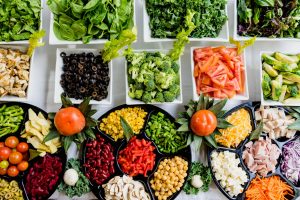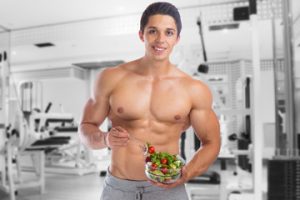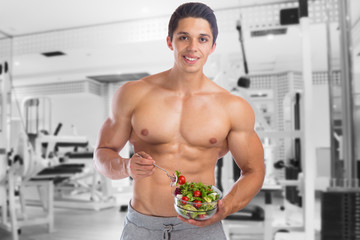Veganism is a lifestyle that abstains from the consumption of any products sourced from animals. It means that those who adhere to this diet do not eat meat, seafood, dairy, or eggs. However, veganism still has its skeptics especially in the sports industry because of the absence of animal protein. The truth is that anyone can survive without eating meat, but can athletes thrive on a vegan diet? Let’s look at the facts.

Can a Vegan Diet Help Your Athletic Performance?
What the experts say
The panic surrounding protein may be unfounded and unnecessary, at least according to dietitians Susan Levin and Ashley Koff. Levin, who works specifically with athletes, says that she’s ‘never met a patient who has had a protein deficiency’ and that it is a ‘non-issue’. An average person requires 0.36 grams of protein per pound of bodyweight which falls somewhere between 46 to 56 grams of protein per day. Meanwhile, an athlete has a greater need for protein at 82 to 136 grams of the recommended amount per day. One of the reasons a carnivorous diet prevails among athletes is convenience. A 9-ounce steak contains nearly 78 grams of protein while one block of tofu contains only 36 grams. In general, athletes, who have busy schedules, might find it easier to prepare a ready-to-cook piece of meat than find alternative sources of the major macronutrient.
But what is the point of veganism, anyway? Aside from eradicating the effects of animal agriculture on the environment, it’s also a push for a healthier lifestyle. As You Must Get Healthy previously pointed out the health hazards of eating meat, red and processed meats specifically are associated with various diseases that impact your lifespan. Meat has high levels of artery-blocking cholesterol that can lead to plaque build up and cause coronary heart disease. Most of the processed meats such as bacon and sausages are also classified as carcinogenic, according to the World Health Organization.
On the other hand, plants have virtually zero cholesterol and have been linked to improved cardiovascular health. Whole food plant-based ingredients are also rich in antioxidants as well as anti-inflammatory and antibacterial properties, which are often called superfoods. Some of these superfoods are dark leafy greens, a variety of berries, green tea, lentils, peas, almonds, walnuts, turmeric, and olive oil.

Can a Vegan Diet Help Your Athletic Performance?
What athletes say
Ultramarathon runner Scott Jurek, who is one of the select few to complete the 189-mile journey on the Appalachian Trail, lives solely off plants. Jurek told GQ that athletes should be more concerned with consuming enough fat than protein. In 46 days, the American averaged 50 miles a day while his wife, Jenny Jurek, followed in a van to bring him food. He recalled increasing the amounts of olive oil on his pasta to fulfill his daily fat requirements.
There is a good kind of fat and a bad kind of fat. Olive oil is the former kind of fat, which is known to regulate blood cholesterol levels and reduce the risk of cardiovascular disease. Vegan sources of healthy fats include nuts, seeds, and vegetable oils. On the other hand, unhealthy fat can be separated into saturated and trans-fats. They are primarily found in meat, poultry, high-fat dairy, eggs, and processed foods. They are deemed unhealthy even in small amounts and can raise the LDL, or “bad” cholesterol, in the body while decreasing the HDL, or “good” cholesterol, at the same time.
A vegan diet is generally a healthier diet, especially when it comes to weight management. Athletes are continuously working to lower their body fat while increasing muscle mass for better performance. Not only can excessive fat slow you down, but it can also put too much strain on the skeletal system, cause problems in the joints and hinder recovery. Some athletes have turned to eliminate meat from their diet for injury prevention, one of whom is the Argentinian footballer Sergio Agüero. Agüero cut meat out of his diet back in 2014 and in the past four years has only missed 38 days of action with a muscle problem. Muscle loss and your ability to recover from physical exertion can also be traced back to a diet laden with unhealthy fats. Many athletes like Agüero are adjusting the way they eat to have more control over their ability to recover faster from injury and keep their bodies in the best possible condition.
The bottom line
Like any other diet, veganism has its advantages and disadvantages. A study on NCBI highlighted that essential nutrient such as B-12, iron, calcium, zinc and Vitamin D could also be sourced from plants. What we’ve learned so far is that a vegan diet requires more planning and attention to detail especially for athletes, but it ultimately leads to better eating habits. When it comes to our overall wellness, there shouldn’t be a limit to the effort that we put into bettering ourselves. So if you are asked, Can a vegan diet help our athletic performance? Yes it can.
Article was specially written for YouMustGetHealthy.com
By: Nancy Felicity









As someone who loves the gym and gaining muscle (all about those glute gains), this is something I struggle with – finding a way to keep my protein intake high but also drastically cutting down on eating animal products. I care about the environment but need to actually start doing something about it instead of just talking.
I understand your struggle. Thanks for reading.
Great content ryt here broski….Will love to try vegan diet sometime in the future…
I completely agree with you. Vegan diet is good enough to provide all the nutrients that athletes or even a common man requires. I am vegetarian and a fitness freak, so with my personal experience I can say there is nothing that you cannot get from a vegan diet.
Thanks for the great post.